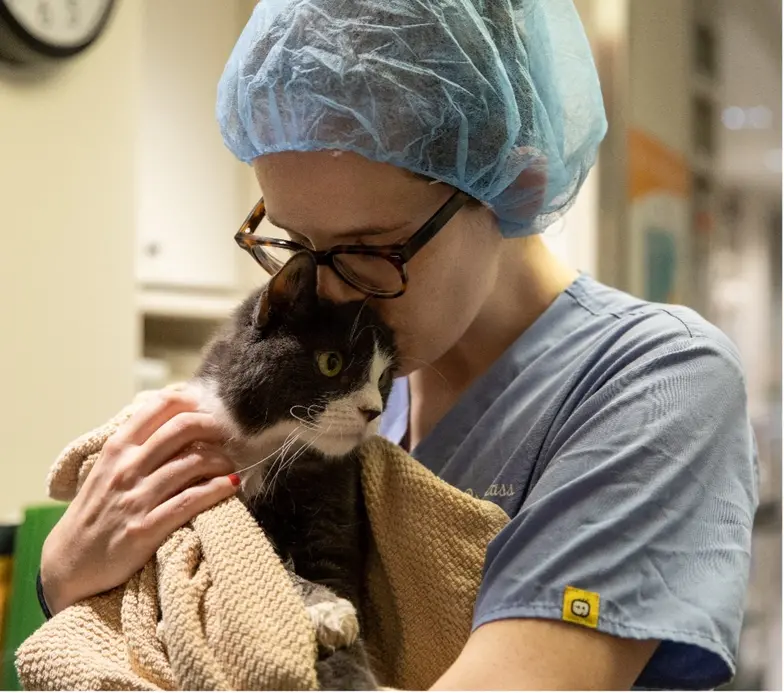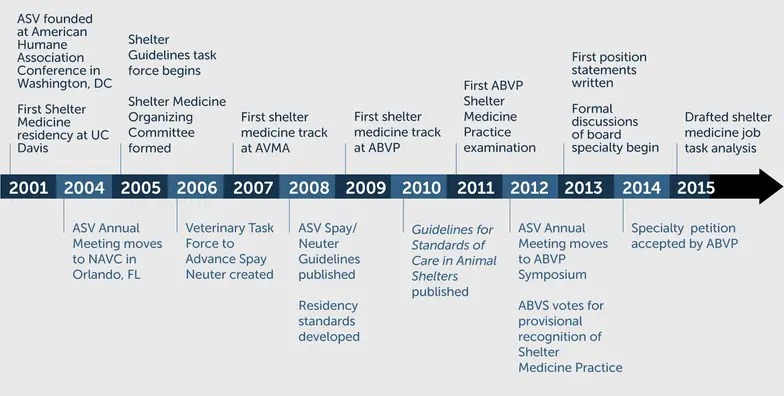Shelter Medicine and the ASPCA

Shelter medicine is a unique field in veterinary medicine dedicated to the care and needs of underserved animals. The specialty includes all aspects of veterinary practice important to the care and management of animals served by shelters. Shelter medicine practitioners must consider the health of the individual animal as well as the entire animal population. They must be knowledgeable in a wide variety of areas, including facility design, operations, animal husbandry, resource management, risk analysis, population management, epidemiology, infectious disease, animal behavior, community outreach, public health, and veterinary forensics, all in addition to traditional medicine and surgery.
Shelter Medicine at the ASPCA®
The ASPCA Shelter Medicine Services (SMS) department works to improve the health and welfare of animals in shelters and communities by strengthening shelter medicine programs, and strategically applying expertise to improve animal health and shelter operations. The team’s veterinarians have extensive experience and expertise in the field. They supports the development and implementation of evidence-based shelter medicine principles by conducting research, publishing resources, performing shelter consultations, and training the next generation of shelter veterinarians.
The members of the Shelter Medicine Services department engage in the increasingly robust network of opportunities in shelter medicine education and training — presenting at numerous sheltering and veterinary conferences, including the annual ASPCA Cornell Maddie’s Shelter Medicine Conference. Team members are also involved in teaching veterinary students and mentoring and training future shelter medicine specialists through the ASPCA’s Practitioner Pathway Mentorship Program and the Julie Morris Shelter Medicine Residency Program.
The SMS Team Includes:
- Dr. Stephanie Janeczko, Vice President of Shelter Medicine Services
- Dr. Melanie Benetato, Director of Shelter Medicine Clinical Training
- Dr. Elizabeth Berliner, Senior Director of Shelter Medicine Training Programs
- Dr. Elise Gingrich, Senior Director of Shelter Medicine
- Dr. Kathy Makolinski, Senior Director of Shelter Medicine
- Dr. Lauren Overman, Senior Director of Shelter Medicine
- Dr. Daniela Lopez Goicochea, Shelter Medicine Resident
- Dr. Eme Chan, Shelter Medicine Resident
- Cassidy Piskorick, Administrative Manager
Shelter Medicine Education
The American Veterinary Medical Association (AVMA) formally recognized shelter medicine as a veterinary specialty in 2014, an acknowledgment that veterinarians who work with or for shelters require special knowledge and skills to design a successful shelter healthcare program. As of 2024, forty-one veterinarians are formally recognized Shelter Medicine Specialists in the United States and Canada, with many more shelter veterinarians in the process of achieving board certification in this new and growing specialty.
The Association of Shelter Veterinarians (ASV) is the professional organization for shelter veterinarians, consisting of over 2000 members and 23 student chapters from around the globe. In addition to cultivating a community of shelter veterinarians, the ASV publishes position statements, spay/neuter and shelter guidelines, and organizes and creates valuable shelter medicine continuing education.
The Journal of Shelter Medicine & Community Animal Health is an independent online journal published by the ASV. The journal publishes original research, case studies, professional guidelines, and review articles relevant to shelter and community animal health, behavior, and welfare.
Most veterinary colleges in the US now include shelter medicine content in their elective and, increasingly, core curricula. Training opportunities for veterinarians continue to expand and include online graduate programs, fellowship opportunities for practicing veterinarians, an increasing number of specialty internships, and residency programs offered through private shelters, national animal welfare organizations, and academic institutions.
Shelter Medicine Achievements
Since its inception as an area of veterinary practice, shelter medicine practitioners have been invaluable contributors to the animal welfare field, including the following achievements:
- Creating and supporting the widespread implementation of shelter health and operational guidelines
- Establishing High-Quality, High-Volume Spay/Neuter (HQHVSN) as a respected field with evidence-based practice guidelines
- Generating new strategies that reduce the impact of infectious diseases like parvovirus, distemper, and ringworm
- Formalizing and championing an approach that considers and addresses all aspects of animals and their needs, medically, behaviorally, and operationally
- Fostering effective population management with techniques like daily rounds, pathway planning, and actively managing capacity for care
- Innovating the shelter’s role in communities through managed intake, kitten nurseries, foster care, community cat programs, and increased access to veterinary care
History of the Association of Shelter Veterinarians

